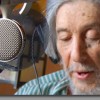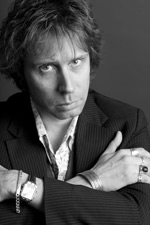“It’s interesting that we came in during a time of war, with Vietnam, and now we’re going out during a time of war, with Iraq and Afghanistan,” says Ed Sanders when asked about the Fugs’ 45-year career.
Yes, it’s true: After nearly five decades of protest, poetry, and provocation, it seems that rock’s original underground band is coming to a close. It’s not for lack of inspiration, though, since there’s no shortage of social injustices to rant about, and the shelves are still filled with the same great literature that has fueled many of the group’s songs. Unfortunately, though, the Fugs are winding down due to the tenuous health of their other founding vocalist and lyricist, Tuli Kupferberg, who at 86 is dealing with the aftereffects of a recent stroke and the blindness that resulted from a bout of pneumonia in 2005.
“Tuli’s clinging on,” reports Sanders, a Woodstock fixture since the 1970s. “Thankfully, he has enough money to pay for nursing and he’s under 24-hour care, still viewing the world with humor.” And somehow, even after all Kupferberg has endured, it’s not so surprising that his sense of wit is intact. After all, comedy, the ironic and irreverent kind in particular, has always been central to his band’s makeup.
The Fugs, who took their name from a censorship-enforced euphemism for the word “fuck” in Norman Mailer’s novel The Naked and the Dead, were formed in 1964 around the activity at Sanders’s Peace Eye bookstore in New York’s Lower East Side. The initial core of Sanders, Kupferberg, and drummer-vocalist Ken Weaver, all veterans of the beat literary scene, decided after one particularly bacchanalian poetry reading to start a band that blended literature and political satire with the then relatively new music called rock ’n’ roll. They formed a loose collective that also included the Holy Modal Rounders’ Peter Stampfel and Steve Weber and other renegade folk and jug band musicians, and began playing downtown galleries and theaters. After winning both accolades and outright hatred for its willfully shambolic music, absurdist stage antics, envelope-pushing profanity, and taboo-shattering lyrical topics, the outfit debuted on Folkways Records with 1965’s The Village Fugs and soon moved on to ESP-Disk for ’66’s self-titled follow-up and ’67’s Virgin Fugs.
Thanks to riotous, confrontational tracks like “Kill For Peace,” “Frenzy,” “Boobs a Lot,” “I Couldn’t Get High,” “Coca Cola Douche,” and “CIA Man,” the act was a hit on the hippie scene, influenced the Velvet Underground and Frank Zappa, and is now hailed as the fundamental proto-punk band and a touchstone of today’s freak-folk movement. In addition to setting the words of Blake, Swinburne, Pound, and other poets to music, the group cut four more LPs for Reprise Records before splitting in 1970. After two solo albums Sanders returned to writing full-time and penned The Family, a bestseller about the Manson murders, and continues to author acclaimed books of poetry and prose (currently he’s working on a memoir of his days with the band).
But, alas, the Fugs weren’t finished. In the Orwellian year of 1984, Sanders and Kupferberg decided to regroup to defile the status quo once again. They assembled a new lineup with guitarist-keyboardist Steve Taylor, drummer-vocalist Coby Batty, and bassist Scott Petito to record the live Refuse to Be Burnt-Out and the studio No More Slavery (both 1985, Big Beat Records). “[Playing in the Fugs] is great, very familial,” says Petito, who runs Catskill’s NRS Studios, where the reunited group has mostly recorded. “The music is always interesting. Since most of us are busy with other projects, we take long breaks.” After one such break—18 years—the band released 2003’s The Fugs Final CD (Part 1) (Rykodisc) not long before Kupferberg’s health began its downturn. (A January 2010 benefit to offset his medical bills featured Lou Reed, Sonic Youth, Laurie Anderson, Phillip Glass, John Zorn, and others.)
Yet while the appearance of two retrospective box sets, 2003’s Electromagnetic Steamboat (Rhino Records) and 2008’s Don’t Stop! Don’t Stop! (Ace Records), kept the buzz going, the dauntless new Fugs were determined to make another record despite Kupferberg’s handicaps. Petito set up recording gear in Kupferberg’s East Village loft and spent months recording the latter’s parts there, to be mixed onto instrumental tracks cut at NRS. The result is the new and bittersweetly titled Be Free! The Fugs Final CD (Part 2) (Fugs Records), which is highlighted by the Sanders-sung title rocker and Kupferberg’s uproarious, pop-music baiting “This is a Hit Song” and his vivid, moving elegy to the now-gone world that shaped him and his band, “Greenwich Village of My Dreams.”
So is this really it for the Fugs? “Well, we can’t say for sure—we’ve said it was before,” offers an audibly wistful Sanders. “It’s really looking that way, though. Without Tuli it wouldn’t be the Fugs. Our legacy is the 300 or so songs we wrote, the boundaries we broke in regard to censorship, and that we were poets who became a band. But, then again, you never know. Tuli’s still at it, still writing. When it’s his time, he’ll definitely go out in a burst of humor.”
Naturally. And one couldn’t ask for a more poetic coda for one of history’s most important musical acts.








